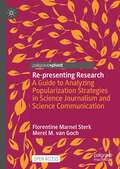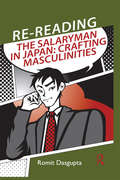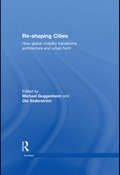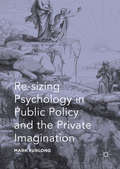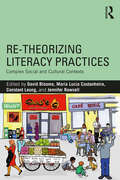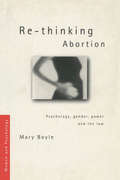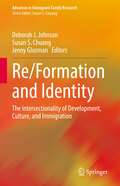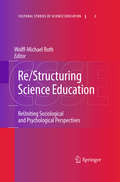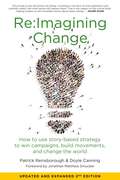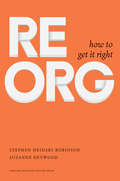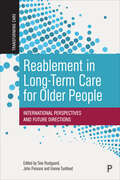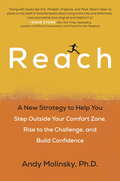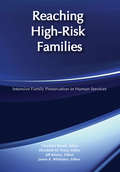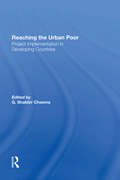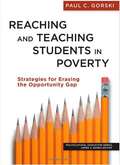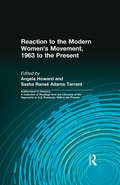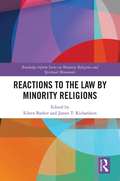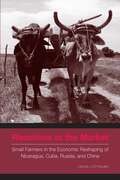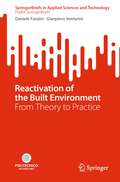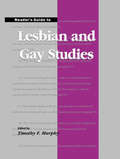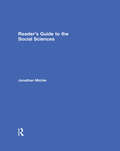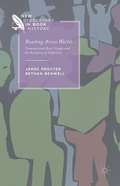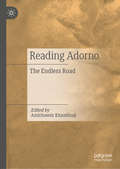- Table View
- List View
Re-presenting Research: A Guide to Analyzing Popularization Strategies in Science Journalism and Science Communication
by Florentine Marnel Sterk Merel M. van GochThis open access book focuses on the textual features, or ‘strategies’, which form popularization discourse. In popularization discourse, research findings from academia are re-presented to make them noteworthy to society and influential for everyday life. Popularization involves recontextualization, or reimagination of findings in an everyday and newsworthy context, and reformulation, the use of audience-appropriate language to increase text comprehension and engagement. ‘Re-presenting research’ presents an empirically grounded, analytic framework for the analysis of popularization texts. Its applicability spans across disciplinary, multidisciplinary, and interdisciplinary fields, and overarches science communication, science journalism, and research communication. The book offers theoretical background information on popularization discourse, empirical underpinning of the construction of the framework, and practical applicability in examples from multiple text types and academic fields. This book acts as a guide for those working with or on popularization discourse – whether it is to analyze it or learn about it.
Re-reading the Salaryman in Japan: Crafting Masculinities (Routledge/Asian Studies Association of Australia (ASAA) East Asian Series)
by Romit DasguptaIn Japan, the figure of the suited, white-collar office worker or business executive ‘salaryman’ (or, sarariiman), came to be associated with Japan’s economic transformation following World War Two. The ubiquitous salaryman came to signify both Japanese masculinity, and Japanese corporate culture, and in this sense, the salaryman embodied ‘the archetypal citizen’. This book uses the figure of the salaryman to explore masculinity in Japan by examining the salaryman as a gendered construct. Whilst there is a considerable body of literature on Japanese corporate culture and a growing acknowledgement of the role of gender, until now the focus has been almost exclusively on women in the workplace. In contrast, this book is one of the first to focus on the men within Japanese corporate culture through a gendered lens. Not only does this add to the emerging literature on masculinity in Japan, but given the important role Japanese corporate culture has played in Japan’s emergence as an industrial power, Romit Dasgupta’s research offers a new way of looking both at Japanese business culture, and more generally at important changes in Japanese society in recent years. Based on intensive interviews carried out with young male private sector employees in Japan, this book makes an important contribution to the study of masculinity and Japanese corporate culture, in addition to providing an insight into Japanese culture more generally. As such it will be of great interest to students and scholars of Japanese studies, Japanese society and gender studies.
Re-shaping Cities: How Global Mobility Transforms Architecture and Urban Form (Architext)
by Ola Söderström Michael GuggenheimThis original collection examines how architectural ideas, social models and building forms circulate round the world and become mediated and adapted to local conditions. The book shows how types such as skyscrapers, mosques or living history museums are imported, adapted and contested in different societies and how urban landscapes are reshaped by the global circulation of models drawn from elsewhere. Written by scholars from different disciplinary backgrounds –architecture, anthropology, geography, linguistics, science studies and sociology – the book draws its inspiration from a series of different approaches and offers both original theoretical reflection and carefully crafted case-studies.
Re-sizing Psychology in Public Policy and the Private Imagination
by Mark FurlongThis book interrogates the current reputation of Psychology, both as an industry and as part of the academy. It disputes Psychology's claim to be a science, questions its claims to effectiveness and examines relationships with other disciplines and fields. Just as Psychology's role in the design of addictive gaming machines has been underplayed so too has the conservative aspect of its regulation of normality and pathology. The discipline of Psychology affects our understanding of identity and subjectivity to position the self as amoral and disconnected. This book questions this assumption and, more generally, the received status of Psychology.
Re-theorizing Literacy Practices: Complex Social and Cultural Contexts
by Constant Leung Jennifer Rowsell David Bloome Maria Lucia CastanheiraMoving beyond current theories on literacy practices, this edited collection sheds new light on the complexities inherent to the social, cultural, and ideological contexts in which literacy practices are realized. Building on Brian V. Street’s scholarship, contributors discuss literacy as intrinsically social and ideological, and examine how the theorizing of literacy practices has evolved in recognition of the diverse contexts in which written language is used. Breaking new intellectual and theoretical ground, this book brings together leading literacy scholars to re-examine how educational and sociocultural contexts frame and define literacy events and practices. Drawing from the richness of Brian V. Street’s work, this volume offers insights into fractures, tensions, and developments in literacy for scholars, students, and researchers.
Re-thinking Abortion: Psychology, Gender and the Law (Women and Psychology)
by Mary BoyleWomen have been able to have abortions legally for over 30 years. Yet few books have considered it as anything other than a health issue. Mary Boyle breaks this mould by considering the constructions of abortion in Western society. Drawing on ideas from sociology, politics, anthropology and law as well as psychology, she shows how abortion is linked to sexual behaviour and motherhood in the complex web of gender and power relations.This book will be of interest to all those engaged with feminist thinking, whether as student, academic, or professional in practice.
Re/Formation and Identity: The Intersectionality of Development, Culture, and Immigration (Advances in Immigrant Family Research)
by Susan S. Chuang Deborah J. Johnson Jenny GlozmanThis innovative book applies contemporary and emergent theories of identity formation to timely questions of identity re/formation and development in immigrant families across diverse ethnicities and age groups. Researchers from across the globe examine the ways in which immigrants from Africa, Asia, Europe, and Latin America dynamically adjust, adapt, and resist aspects of their identities in their host countries as a form of resilience. The book provides a multidisciplinary approach to studying the multidimensional complexities of identity development and immigration and offers critical insights on the experiences of immigrant families. Key areas of coverage include: Factors that affect identity formation, readjustment, and maintenance, including individual differences and social environments. Influences of intersecting immigrant ecologies such as family, community, and complex multidimensions of culture on identity development. Current identity theories and their effectiveness at addressing issues of ethnicity, culture, and immigration. Research challenges to studying various forms of identity. Re/Formation and Identity: The Intersectionality of Development, Culture, and Immigration is an essential resource for researchers, professors, and graduate students as well as clinicians, professionals, and policymakers in the fields of developmental, social, and cross-cultural psychology, parenting and family studies, social work, and all interrelated disciplines.
Re/Structuring Science Education
by Wolff-Michael RothSince its beginnings, science education has been under the influence of psychological theories of knowing and learning, while in more recent years, social constructivist and sociological frameworks have also begun to emerge. With little work being done on showing how the perspectives of these separate approaches might be integrated, this work aims to plug the gap. The book helps lay the groundwork for reuniting sociological and psychological perspectives on the knowing, learning, and teaching of science. Featuring a range of integrative efforts beginning with simple conversation, the chapters here include not only articles but also commentaries that engage with other papers, as well as a useful running narrative that, from the introduction to the epilogue, contextualizes the book and its sections. Specific attention is given to cultural-historical activity theory, which already offers an integration of psychological and cultural-historical (sociological) perspectives on collectively motivated human activities. A number of chapters, as well as the contextualizing narrative, explicitly use this theory as a framework for rethinking science education to achieve the reunification that is the goal of this work. All the contributors to this volume have produced texts that contribute to the effort of overcoming the extant divide between sociological and psychological approaches to science education research and practice. From very different positions--gender, culture, race--they provide valuable insights to reuniting approaches in both theory and method in the field. As an ensemble, the contributions constitute a rich menu of ideas from which new forms of science education can emerge.
Re: How to Use Story-based Strategy to Win Campaigns, Build Movements and Change the World
by Doyle Canning Patrick ReinsboroughThis unique book explores how culture, media, memes and narrative intertwine with social change strategies, and offers practical methods to amplify progressive causes in the popular culture.
ReOrg: How to Get It Right
by Suzanne Heywood Stephen Heidari-RobinsonA Practical Guide in Five StepsMost executives will lead or be a part of a reorganization effort (a reorg) at some point in their careers. And with good reason-reorgs are one of the best ways for companies to unlock latent value, especially in a changing business environment.But everyone hates them.No other management practice creates more anxiety and fear among employees or does more to distract them from their day-to-day jobs. As a result, reorgs can be incredibly expensive in terms of senior-management time and attention, and most of them fail on multiple dimensions. It's no wonder companies treat a reorg as a mysterious process and outsource it to people who don't understand the business. It doesn't have to be this way.Stephen Heidari-Robinson and Suzanne Heywood, former leaders in McKinsey's Organization Practice, present a practical guide for successfully planning and implementing a reorg in five steps-demystifying and accelerating the process at the same time. Based on their twenty-five years of combined experience managing reorgs and on McKinsey research with over 2,500 executives involved in them, the authors distill what they and their McKinsey colleagues have been practicing as an "art" into a "science" that executives can replicate-in companies or business units large or small. It isn't rocket science and it isn't bogged down by a lot of organizational theory: the five steps give people a simple, logical process to follow, making it easier for everyone-both the leaders and the employees who ultimately determine a reorg's success or failure-to commit themselves to and succeed in the new organization.
Reablement in Long-Term Care for Older People: International Perspectives and Future Directions (Transforming Care)
by Tine Rostgaard, John Parsons, and Hanne TuntlandOur societies are ageing, and we need to identify sustainable and person-centred solutions for supporting frail older people in their homes. Reablement offers a radical new integrated care approach which supports older people to regain and maintain functioning and independence. This interdisciplinary book provides an introduction to the remarkable, if haphazard, international growth in reablement policies and practices in aged care over the past 20 years. Incorporating theoretical and empirical research, it considers benefits for clients and care workers, cost-saving potentials and reablement provision for people with dementia. Finally, the book reflects on key findings, challenges and the way forward for long-term care for older people.
Reach: A New Strategy to Help You Step Outside Your Comfort Zone, Rise to the Challenge , and Build Confidence
by Andy MolinskyDo you feel comfortable delivering bad news? Do you look forward to speaking in public? Do you enjoy networking? Is it easy for you to speak your mind and be assertive with friends and colleagues? If you answered no to any of these questions, this book can help! What often sets successful people apart is their willingness to do things most of us fear. What’s more, we have the false notion that successful people like to do these things, when the truth is that successful people have simply found their own way to do them.According to Andy Molinsky, an expert on behavior in the business world, there are five key challenges underlying our avoidance tendencies: authenticity, competence, resentment, likability, and morality. Does the new behavior you’re attempting feel authentic to you? Is it the right thing to do? Answering these questions will help identify the “gap” in our behavioral style that we can then bridge by using the three C’s: Clarity, Conviction, and Customization. Perhaps most interesting, Molinsky has discovered that many people who confront what they were avoiding come to realize that they actually enjoy it, and can even be good at it.Short, prescriptive, and based not only on the author’s groundbreaking research but on his own quest to get out of his comfort zone, Reach will help you take the thing you are most afraid of doing and make it a proud part of your personal repertoire.
Reaching High-Risk Families: Intensive Family Preservation in Human Services - Modern Applications of Social Work (Modern Applications Of Social Work Ser.)
by Elizabeth TracyFocusing on a program (""Homebuilders"") that has attracted national attention, this book develops implications for family-centered curricula in such areas as social policy, direct practice, program design/management, practice research, theory and prevention.
Reaching The Urban Poor: Project Implementation In Developing Countries
by G. Shabbir Cheema G Shabbir CheemaAs urban populatiCC'lS in developing countries oootinue to grow rapidly, cne of the nest critical issues in the Third W:lrld has beoane p:rovidirYJ shelter and other basic services such as clean water, heal th clinics, and sewage disposal to the urban poor. This book of nine case studies of urban programs and projects in Ind:oesia, Kenya, Malaysia, Nigeria, Pakistan, South Korea, India, and Sri Lanka focuses en impediments to slum upgrading. The authour discuss each project's evoluticn, the capabilities and resources of inplenenting agencies, the problems of interagency relaticoships and coordinaticn, costs and funding, the difficulties of developing effective linkages with poor cx:mnunities, and the accessibility of the new services to the urban poor.
Reaching and Teaching Students in Poverty: Strategies for Erasing the Opportunity Gap (Multicultural Education Series)
by Paul C. GorskiThe author draws from decades of research to deconstruct popular myths, misconceptions, and educational practices that undercut the achievement of low-income students. Gorski carefully describes the challenges that students in poverty face and the resiliencies they and their families draw upon. This book provides specific, evidence-based strategies for teaching youth by creating equitable, bias-free learning environments. This resource will help teachers and school leaders to better reach and teach students in poverty.
Reaction to the Modern Women's Movement, 1963 to the Present (Antifeminism In America: A Collection Of Readings From The Literature Of The Opponents To U. S. Feminism, 1848 To The Present Ser. #3)
by Angela Howard Sasha Ranaé Adams TarrantAntifeminism in cultural context To give today's readers an understanding of the social and political forces that actively fought against any changes in women's status in the United States, the editors selected these original examples from the writings of the time that appeared in popular books and magazines. Opponents of women's equality frequently voiced their opinions about 19th-century issues of women's suffrage, dress reform, self-expression, independence, and other topics that touched upon the perceived roles and duties of women. Such public diatribes continued into the 10th century as determined antifeminists argued against increased opportunities for women in employment and education, denied the propriety of family planning, and admonished against women's involvement in politics. Arguments based on ridicule, natural law, and false claims Some opponents merely dismissed or ridiculed calls for changes in women's status, without specifying particular flaws in the feminist position. Others cited divine ordination, applied to natural law, and fanned public fears of familial and social disintegration. Frequently these critics resorted to charges of presumed lesbianism, communism, and socialism against advocates of women's rights and against the movement itself. This adamant opposition to equality for women was a manifestation of common apprehension about ongoing social, economic, and political changes beyond antifeminist control. Antifeminists in their own words Today few people have even an inkling of the vehemence, theatrical posturing, and convoluted reasoning of the antifeminist forces. This varied selection of original sources puts an illuminating spotlight on the arguments presented by opponents of women's equality that is drawn from an extensive body of writings, ranging from the elegant pronouncements of a popular politician to sincere endorsements of the status quo by female apologists for those opposed to the women's movement, to purveyors of low satire in the popular press. For modern readers, this collection provides the opportunity to encounter directly the reasoning, opinions, and perceptions of those that resisted and criticized the goals and achievements of feminism. A valuable resource for many disciplines. A particularly valuable feature of this set is its wealth of primary source material from the 19th and early 20th centuries, including material from books and newspapers. Very few libraries have collected these sources and chances are no single collection has them all. These volumes are of great interest to women's studies, women's history, gender studies, cultural studies, as well as history, political science, sociology, and literature. Many of the examples of antifeminist writing found in the set can enrich classroom discussions and assignments that involve communication, writing, and rhetoric. Available individually by volume 1. Opposition to the Women's Movement in the United States, 1848-1929 (0-8153-2713-7) 400 pages 2. Redefining the New Woman, 1920-1963 (0-8153-2714-5) 344 pages 3. Reaction to the Modern Women's Movement, 1963 to the Present (0-8153-2715-3) 352 pages
Reactions To the Law by Minority Religions (Routledge Inform Series on Minority Religions and Spiritual Movements)
by Eileen Barker and James T. RichardsonMuch has been written about the law as it affects new and minority religions, but relatively little has been written about how such religions react to the law. This book presents a wide variety of responses by minority religions to the legal environments within which they find themselves. An international panel of experts offer examples from North America, Europe and Asia demonstrating how religions with relatively little status may resort to violence or passive acceptance of the law; how they may change their beliefs or practices in order to be in compliance with the law; or how they may resort to the law itself in order to change their legal standing, sometimes by forging alliances with those with more power or authority to achieve their goals. The volume concludes by applying theoretical insights from sociological studies of law, religion and social movements to the variety of responses. The first systematic collection focussing on how minority religions respond to efforts at social control by various governmental agents, this book provides a vital reference for scholars of religion and the law, new religious movements, minority religions and the sociology of religion.
Reactions to the Market: Small Farmers in the Economic Reshaping of Nicaragua, Cuba, Russia, and China (Rural Studies)
by Laura J. EnríquezIt is manifest in developing countries around the world that the “shock” therapy administered to their economies by the neoliberal model of structural adjustment has failed, leaving much social and economic destruction in its wake. In Latin America this failure has led to a resurgence of interest in alternative models, some of them deploying various versions of socialism, as in Bolivia, Chile, and Venezuela, which has given rise to talk about the new “pink tide” enveloping the region. In this comparative study of four economies that have been making a transition to the market from their orthodox socialist pasts, Laura Enríquez focuses our attention on the plight of the small farmer in particular and on the importance of this sector for the overall socioeconomic success of the transition. Through this comparison, we see the similarities between Nicaragua and Russia in their rapid retreat from socialism and their adoption of reforms that have placed small agriculture, especially that focused on food crops, at a distinct disadvantage relative to export-oriented production. By contrast, Cuba has been more like China in adopting aspects of market reform while emphasizing small-scale cooperative and private farming in an effort to achieve food self-sufficiency. Drawing insights from Karl Polanyi’s study of the social and economic effects of the expansion of market relations in the nineteenth century, Enríquez highlights the role of the state in each of these countries in driving change in a certain direction: toward de-emphasis of small-scale farming and the eventual assumed demise of the peasantry in Nicaragua and Russia, which has led to countermovements of peasants struggling to survive, and toward the reconfirmation of the value of small farming in contributing to balanced economic development in Cuba and China.
Reactivation of the Built Environment: From Theory to Practice (SpringerBriefs in Applied Sciences and Technology)
by Daniele Fanzini Gianpiero VenturiniThe book deals with urban reactivation, a particular form of regeneration intervention which in addition to the physical-spatial dimension of the places also—and above all—considers the social and relational dynamics that the intervention is able to activate. In this sense, the concept of activation (or reactivation) emphasizes the act of putting something into or back into operation, whether it concerns the material components of a container (a building or a place) or the immaterial components of a content (a need, or a function), starting from the exploitation of opportunities that the architectural project contributes to revealing, developing and accompanying.
Reactive Attachment Disorder
by Daniel F. ShreeveA child's close bond with mother, father, or guardian usually provides a foundation for trust in all future attachments. Children deprived of early and healthy dependency--who do not form normal attachment with their caregivers--may later suffer from Reactive Attachment Disorder (RAD). This childhood disorder is characterized by a general failure in social relationships resulting from pathogenic care. Although first included in the third edition of the Diagnostic and Statistical Manual (DSM-III) in 1980, RAD is one of the more uncommon and understudied forms of psychopathology. Reactive Attachment Disorder: A Case-Based Approach adds to a now growing research base, providing scholars and clinicians with a well-rounded analysis of RAD and suggested treatments. The case-based approach used in this Brief follows the representative case of "Jorge," presented as unfolding over time and structured to illustrate challenges of diagnosis, to show examples of co-morbidity, and to provoke reflection on what questions may arise during treatment. Readers are asked to appraise the overlap with other clinical syndromes, the forms of psychotherapy which may apply, and the potential role of psychiatric medications as part of a comprehensive treatment plan.
Read the Label!: Discover what's really in your food
by Richard EmersonDo you know the difference between 'Use by' and 'Best before'? Or what is meant by 'Farmhouse' or 'Home-made'? And did you know that 75% of the salt we consume each day is added by food manufacturers during preparation or processing?Read the Label! is a must-have reference book that exposes the reality of food labelling and provides comprehensive information on how food manufacturers can manipulate the facts. With an in-depth examination of the common ingredients found in our foods, information on how far you can trust the food label and clear guidance on how to make an informed decision about the products you buy, this book will change the way you shop forever.
Reader's Guide to Lesbian and Gay Studies
by Timothy F. MurphyThe Reader's Guide to Lesbian and Gay Studies surveys the field in some 470 entries on individuals (Adrienne Rich); arts and cultural studies (Dance); ethics, religion, and philosophical issues (Monastic Traditions); historical figures, periods, and ideas (Germany between the World Wars); language, literature, and communication (British Drama); law and politics (Child Custody); medicine and biological sciences (Health and Illness); and psychology, social sciences, and education (Kinsey Report).
Reader's Guide to the Social Sciences (Reader's Guides Ser.)
by Jonathan MichieThis 2-volume work includes approximately 1,200 entries in A-Z order, critically reviewing the literature on specific topics from abortion to world systems theory. In addition, nine major entries cover each of the major disciplines (political economy; management and business; human geography; politics; sociology; law; psychology; organizational behavior) and the history and development of the social sciences in a broader sense.
Reading Across Worlds
by James Procter Bethan BenwellCombining sustained empirical analysis of reading group conversations with four case studies of classic and contemporary novels: Things Fall Apart, White Teeth, Brick Lane and Small Island, this book pursues what can be gained through a comparative approach to reading and readerships.
Reading Adorno: The Endless Road
by Amirhosein KhandizajiThis book draws on core concepts coined by Adorno, such as identity thinking, the culture industry, and his critique of the autonomous and rational subject, to address the ills that plague neoliberal capitalist societies today. These ills range from the risk of a return to totalitarian tendencies, to the global rise of the far-right, and anti-feminist conceptions of motherhood. Subsequent chapters outline the ways in which Adorno's thought can also be seen to redress the challenges of modern societies, such as the critical function of artworks, and the subversive potential of slow-food and popular music. The important underlying concern of the book is to highlight the continuing relevance of Adorno, both in dealing with the failures of neo-liberal capitalist societies, and in his applicability to a wide range of disciplines.
